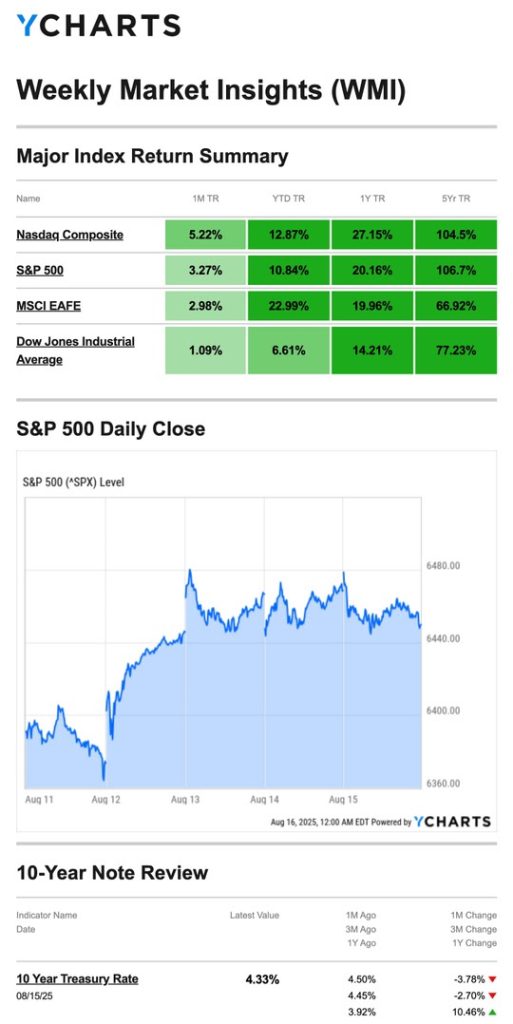By: Gerry Sparrow
Stocks rose last week despite mixed signals on inflation as investors kept one eye on the Fed’s September meeting.
The Standard & Poor’s 500 Index advanced 0.94 percent, while the Nasdaq Composite Index added 0.81 percent. The Dow Jones Industrial Average rose 1.74 percent. The MSCI EAFE Index, which tracks developed overseas stock markets, increased 2.16 percent.1,2
Third Gain in Four Weeks
Stocks posted modest losses to start the week as investors braced for July consumer inflation reports. The White House’s executive order on Monday extending the tariff deadline for China by 90 days failed to move markets in the other direction.3
Stocks then staged a two-day rally following the latest Consumer Price Index (CPI) report, which showed July inflation held steady over the prior month—beating expectations. The inflation news led some investors to move into small-cap stocks, with the Russell 2000 Index of small-cap stocks rising 5 percent over Tuesday and Wednesday.4However, markets slipped Thursday as investors dug into the Producer Price Index (PPI) for July, which showed wholesale inflation hit a 3-year high last month; this was the third weekly gain in the past four weeks for each of the three major averages; the S&P and Nasdaq advanced four of the last five weeks.5,6,7

Source: YCharts.com, August 16, 2025. Weekly performance is measured from Monday, August 11, to Friday, August 15. TR = total return for the index, which includes any dividends as well as any other cash distributions during the period. Treasury note yield is expressed in basis points.
A Mixed Inflation Story
Inflation continues to give mixed signals, which can unsettle investors who anticipate the Fed adjusting rates at its September meeting.
Last week’s CPI report showed that “headline” (retail) inflation held steady. Stocks rose in response, even though core inflation—excluding volatile food and energy prices—was hotter than economists expected.
Two days later, the PPI report revealed that inflation began to creep into wholesale prices in July. Stocks fell in response as investors processed the conflicting reports.8,9
This Week: Key Economic Data
Monday: Homebuilder Confidence Index.
Tuesday: Housing Starts. Building Permits. Federal Reserve Official Michelle Bowman speaks.
Wednesday: Minutes from Fed’s FOMC July Meeting. Federal Reserve Official Christopher Waller and Atlanta Fed President Raphael Bostic speak.
Thursday: Weekly Jobless Claims. Services & Manufacturing PMI Composite. Existing Home Sales. Leading Economic Indicators. 30-Year TIPS (Treasury Inflation-Protected Securities) Auction. Fed Balance Sheet. Atlanta Fed President Raphael Bostic speaks.
Friday: Fed Chair Jerome Powell speaks.
Source: Investors Business Daily – Econoday economic calendar; August 15, 2025
The Econoday economic calendar lists upcoming U.S. economic data releases (including key economic indicators), Federal Reserve policy meetings, and speaking engagements of Federal Reserve officials. The content is developed from sources believed to be providing accurate information. The forecasts or forward-looking statements are based on assumptions and may not materialize. The forecasts also are subject to revision.
Originally posted on August 8, 2025
PHOTO CREDIT: https://www.shutterstock.com/ai-image-generator
VIA SHUTTERSTOCK
FOOTNOTES AND SOURCES
1. WSJ.com, August 15, 2025
2. Investing.com, August 15, 2025
3. CNBC.com, August 11, 2025
4. CNBC.com, August 13, 2025
5. MarketWatch.com, August 14, 2025
6. WSJ.com, August 15, 2025
7. WSJ.com, August 15, 2025
8. CNBC.com, August 12, 2025
9. MarketWatch.com, August 14, 2025
DISCLOSURES
Investing involves risks, and investment decisions should be based on your own goals, time horizon, and tolerance for risk. The return and principal value of investments will fluctuate as market conditions change. When sold, investments may be worth more or less than their original cost.
The forecasts or forward-looking statements are based on assumptions, may not materialize, and are subject to revision without notice.
The market indexes discussed are unmanaged, and generally, considered representative of their respective markets. Index performance is not indicative of the past performance of a particular investment. Indexes do not incur management fees, costs, and expenses. Individuals cannot directly invest in unmanaged indexes. Past performance does not guarantee future results.
The Dow Jones Industrial Average is an unmanaged index that is generally considered representative of large-capitalization companies on the U.S. stock market. The Nasdaq Composite is an index of the common stocks and similar securities listed on the Nasdaq stock market and considered a broad indicator of the performance of stocks of technology and growth companies. The MSCI EAFE Index was created by Morgan Stanley Capital International (MSCI) and serves as a benchmark of the performance of major international equity markets, as represented by 21 major MSCI indexes from Europe, Australia, and Southeast Asia. The S&P 500 Composite Index is an unmanaged group of securities that are considered to be representative of the stock market in general.
U.S. Treasury Notes are guaranteed by the federal government as to the timely payment of principal and interest. However, if you sell a Treasury Note prior to maturity, it may be worth more or less than the original price paid. Fixed income investments are subject to various risks including changes in interest rates, credit quality, inflation risk, market valuations, prepayments, corporate events, tax ramifications and other factors.
International investments carry additional risks, which include differences in financial reporting standards, currency exchange rates, political risks unique to a specific country, foreign taxes and regulations, and the potential for illiquid markets. These factors may result in greater share price volatility.
Please consult your financial professional for additional information.
This content is developed from sources believed to be providing accurate information. The information in this material is not intended as tax or legal advice. Please consult legal or tax professionals for specific information regarding your individual situation. This material was developed and produced by FMG Suite to provide information on a topic that may be of interest. FMG is not affiliated with the named representative, financial professional, Registered Investment Advisor, Broker-Dealer, nor state- or SEC-registered investment advisory firm. The opinions expressed and material provided are for general information, and they should not be considered a solicitation for the purchase or sale of any security.
Important Risk Information
Investing involves risk. Principal loss is possible.
If the adviser’s perceptions of a company’s growth potential are wrong, the securities purchased may not perform as expected, reducing the Fund’s return. Investments in small and midcap companies generally have greater risk and volatility. Diversification does not assure a profit or protect against a loss in a declining market.
The fund’s investment objectives, risks, charges and expenses must be considered carefully before investing. The prospectus contains this and other important information about the investment company, and it may be obtained by calling 888-727-3301 or visiting www.sparrowcapital.com. Read it carefully before investing.




